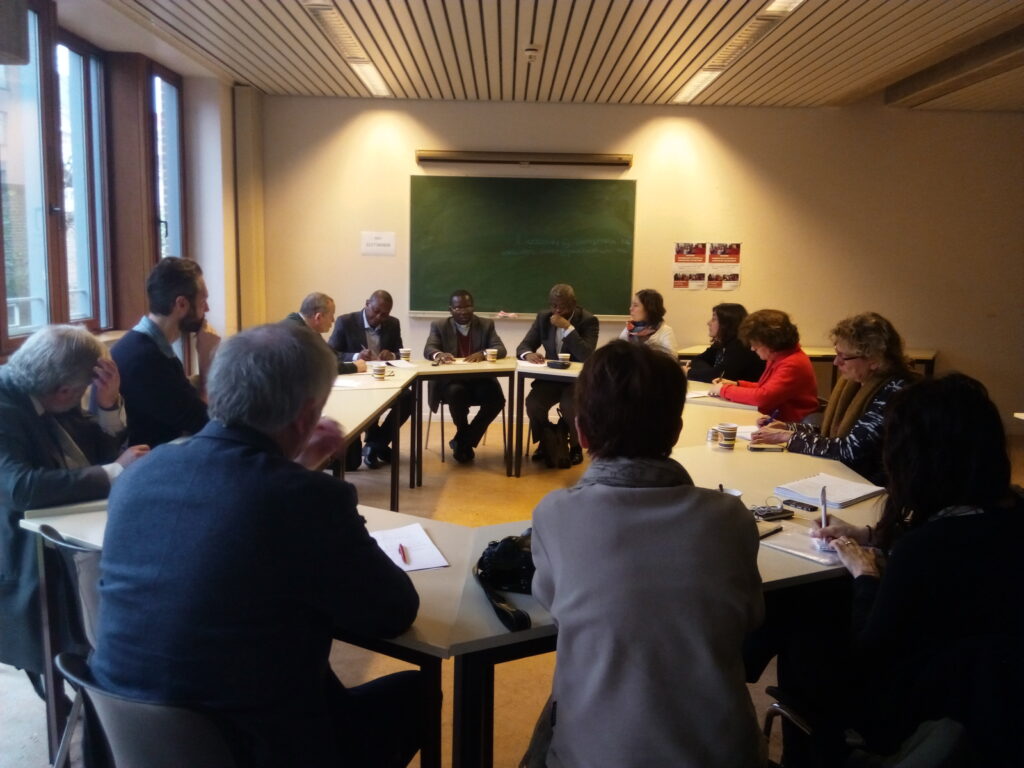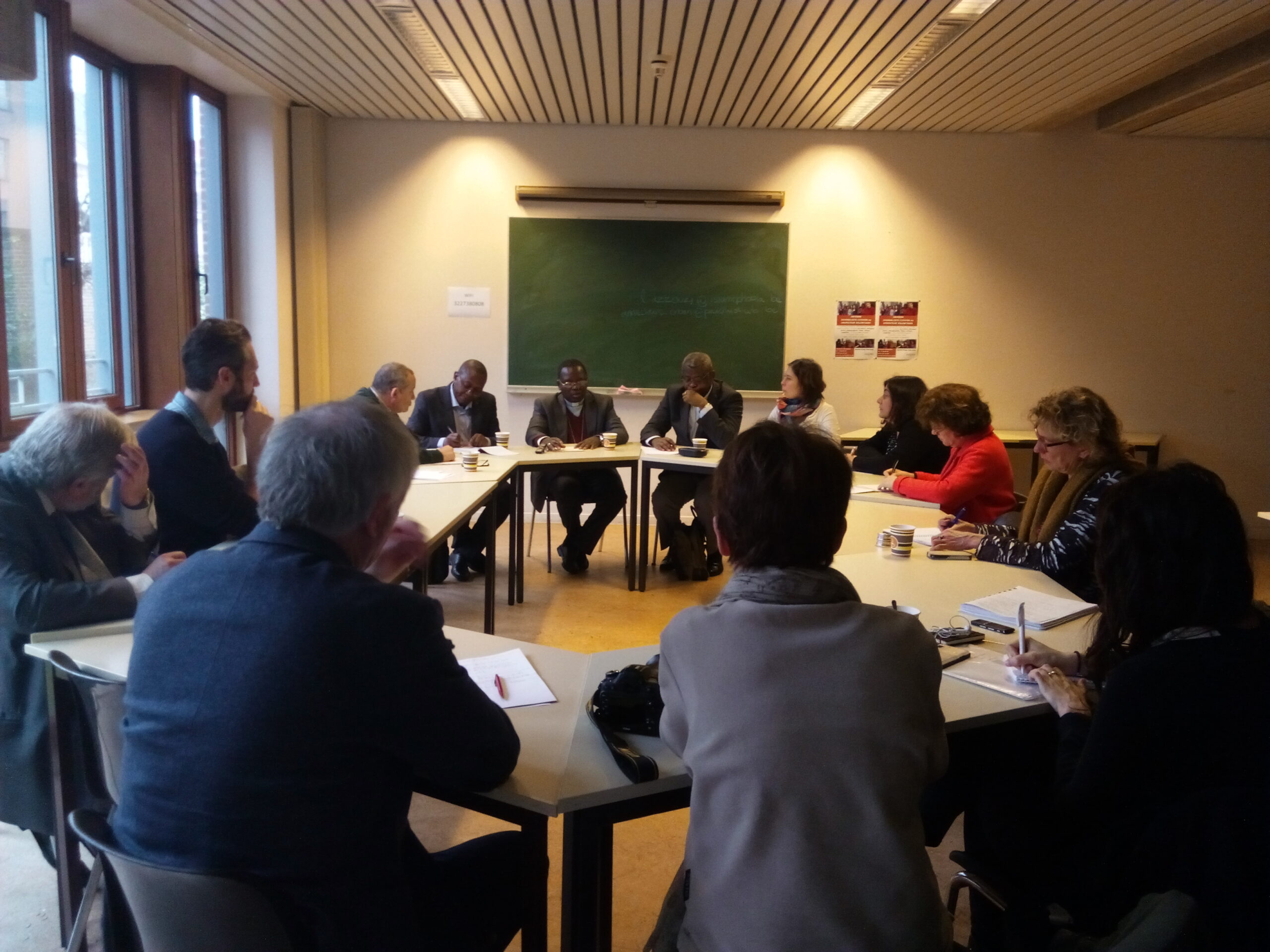
L’Eglise Catholique, en Afrique subsaharienne, poursuit sa lutte pour le respect de la charte des droits de l’Homme et des peuples, pour laquelle elle joue un rôle prophétique de « voix des sans-voix ». Sa véritable place, « au milieu du village », la pousse à travailler au service de la paix, la justice et la réconciliation.
In 1995, Pope John Paul II convened an assembly of Bishops to evaluate his mission in the face of the great challenges facing the African continent. The increase in injustices and inequalities had plunged the majority of the African people into a situation of poverty, below an acceptable level. The synod wanted to position itself on issues linked to social justice, a sign of solidarity and mutual aid. This took place in a context where certain African political leaders had enriched themselves enormously by monopolizing most of the wealth with the complicity of the great powers and to the detriment of the populations.
In 2020, 25 years later, the mission of the Bishops still promises to be decisive for the liberation of African populations, still victims of the endemic violence raging in Central Africa; scene of multiple fratricidal wars decimating populations by making them increasingly poor. In this sordid context of the spoliation of natural resources, tribalism, racism... new global challenges are reconfiguring the international scene.
Does the African Church still have a role to play in the great global changes? To understand the journey of the Church in Africa, today we take a look at the synods of bishops facing the great challenges of the continent. Also, we will look more closely at a particular example, that of the DR Congo through the commitment of the National Episcopal Conference of Congo (CENCO), an assiduous witness and committed actor in the face of the socio-political transitions that the country is going through.
During the colonial era, the involvement of the Catholic Church in social life was already present. La création en 1954 à Léopoldville (actuelle ville de Kinshasa) de l’Université de « Lovanium » par les Jésuites en provenance de Belgique en est une illustration significative. Dans cette période d’émulation des pensées, au lendemain des indépendances, s’est fait sentir, dans un premier temps, une vive effervescence en faveur d’une affirmation identitaire, doublée de la volonté de s’approprier la gestion politique de la nation, Certains auteurs ont fustigé l’appel à un « African Christianity » qui serait, de ce fait, devenu au sein de l’Eglise catholique en Afrique ce que la lutte pour l’indépendance se voulait sur le terrain politique [1]CUCHET G., The conciliar drama from Antiquity to Vatican II, Presses Universitaire du Septentrion, Villeneuve d’Ascq, 2019..
Once independence was "conquered", the territorial limits of the newly constituted States kept their territories by referring to the configuration of the borders established at the Berlin Conference of 1885 rather than to that of the old kingdoms before the exploratory expeditions and /or slavers.
Freed therefore from colonial practices, the international scene was still tainted by stigmas and forms of conditionality of international cooperation jeopardizing the achievement of the great aspirations of political, economic, social and cultural development of the African nations which had recently become independent.
A particular awakening in the head of the Church has thus invited reflection on the destiny of the continent and its economic and social growth because, according to her, the barely veiled dependence, either in development aid or in cooperation, would have created good frustrations.
Africans wanted to be the first actors in their own development. It is in this context that the Pan-African movement was formed, denouncing the interference of the great powers and the predation of natural resources to the detriment of the people.
L'organization of African Unity (OAU), whose advent was felt to be a decisive step for the promotion of Human Rights, was born a few years after independence (1963-2002). The organization, however, saw itself limited in the exercise of its skills in relation to the vision it initially assigned to itself when creating [2]FATTANI T., the African Union and development, between hopes and illusions, Harmattan, Paris, 2004.. Coming from an original and authentic impulse of patriotism, of pan-Africanism and Africanness, the African Union (AU), which is its direct descendant, still works today with bilateral and multilateral financial donors in order to build its development and its decision-making autonomy.
After the visit of Pope John Paul II to Rwanda and Burundi (September 5-7, 1990), the tragedy occurred which particularly challenged the African Bishops: the dispute between the Hutus and the Tutsis in 1994, which left nearly 800,000 dead and pushed more than 2 million Rwandans out of their country. Faced with the situation that prevailed in Africa at the end of the Cold War and the stagnant level of poverty, the African Bishops invited more economically stable countries to promote fair trade with Africa as well as job creation and establishment of the rule of law. The Church has also assigned itself the mission of working for education, respect for human dignity and fundamental freedoms. The Church, to carry out the new mission it has given itself, is endowing itself with new bodies like the Episcopal Justice and Peace Commission which gave birth, almost everywhere in the world, to the various " justice and peace commissions ". These latter were at the origin of the desire to provide the impetus for taking charge of responsibilities, at all levels of society, thus opening another chapter of " political pastoral » [3]Philippe Büttgen, Political theology and pastoral power, Annals. History, Social Sciences 62nd Year, No. 5, Cambridge University Press, (September-October 2007), pp. 1129-1154 (26 pages)..
From this synod of 1995, the Church in Africa has given itself the mission of working actively for peace, and in a preventive manner, whenever internal and external conflicts emerge across borders inherited from colonial powers. The coexistence of different ethnic groups, traditions, languages and even religions still causes serious hostilities today.
The example of Belgium, which is today trying to courageously confront the problem of decolonization, is a precursor to the construction of a harmonious future. A multidisciplinary team of ten members was responsible for preparing the main lines of reflection for the aforementioned parliamentary commission of inquiry. The Parliamentary Commission for Decolonization is a perfect illustration of this. Decolonization Commission: a first group of experts responsible for demining Belgian history in the Congo. For African Bishops: “ Africa should be helped in an unconditional way [4]The African Synod. Ten years after. The Church-Family of God. Interest, results and prospects, in RUCAO 20 (2004, special issue).". Particular attention should also be given to the role of women, young people and the family (place of education in peace and justice) within the Church which must no longer evolve in isolation from endogenous clericalism.
L’internationalisation a significativement impacté certaines valeurs de la culture africaine. Les acquis de partage, de solidarité et d’accueil des étrangers ainsi que le respect suprême de la vie ont été ainsi détériorés. Ces valeurs intrinsèques à la gestion ancestrale du bien commun ne sont pas incompatibles avec l’évolution du monde. Les populations africaines contemporaines devraient davantage s’en inspirer. L’entraide intra et inter communautaire pourra conséquemment atténuer l’hégémonie de l’individualisme qui repose sur la recherche effrénée du gain égocentrée. Il y a un besoin d’une pastorale de milieu de vie [5]Henri Godin and Yvan Daniel, France, mission country, Paris, 194. concept which is integrated in the expression of “ l’Église sortante » mentioned by Pope Francis (Evangeli Gaudium, 2013).
In DR Congo, the Catholic Church has always participated in the political-social dynamic whenever the need has arisen or when it has been invited as a protagonist. She has spared no effort in fighting the dictatorship and then in supporting the citizen in the process of democratization of the country. We will remember his involvement during the Sovereign National Conference (CNS) and its role in the first pluralist elections. Today, it is the most active and most represented institution throughout the country. The National Episcopal Conference of Congo (CENCO) supports public services, very often in place of state bodies: for example, it runs more than 60% of the country's schools and the majority of health structures, while also assuming multiple development projects.
Recently, thanks to its involvement, it made possible the holding of the elections of December 30, 2018. In this quest for democracy, it proceeded through protests and citizen pressure. As a last resort, she was invited, by the Kabila government at the end of its mandate and faced with explosive popular discontent, to ensure the “ good offices [6]Good offices: process aimed at concerting in order to bring together the stakeholders in a conflict through mediation. » which could have led to the “ New Year's Eve agreements ". These agreements were able to narrowly prevent a chaotic explosion in Central Africa. Signed on December 31, 2016, these aimed to establish an electoral calendar enforceable against all stakeholders (political opposition, civil society and presidential movement). This experience of CENCO in the struggle and support of the democratization process increasingly inspires other episcopal conferences in Africa, notably in Chad, Togo, and recently in the Central African Republic and Burundi where there is a context almost similar to a political crisis. Due to its anchoring in different regional and international structures, the Episcopal Conference of Congo can thus demonstrate its initiatives in favor of democracy. CENCO is integrated into the sub-region, within the Association of Episcopal Conferences of Central Africa (ACEAC) and it sits within the Symposium of Episcopal Conferences of Africa and Madagascar (SEEAM). This legitimacy gives it regional and continental influence, which allows it to relay its messages of hope and confidence.
Faced with human tragedies, massacres, political manipulation and predation of natural resources, CENCO has given itself a mission to promote the active involvement of citizens in the organization of their society and their economic and political destiny. The fight against corruption and all forms of embezzlement, as well as the prevention of conflicts, remains its main focus.
It is thus part of the logic already specified in the past by the Church.
Currently, however, the situation seems to be getting worse, corruption in the political world seems to be the rule in the Great Lakes sub-region. [7]Pourtier R., Kivu in the war: actors and issues, Echogéo, 2019. and identity and ethnic-tribal conflicts still raise questions.
DR Congo is still affected by conflicts. The majority of its population lives after 60 years of independence below the poverty line, still maintaining a low level of education. Unemployment, various illnesses including the current one of Covid-19 and other social ills are recorded. CENCO, which has been involved through concrete actions in favor of peace and social development, remains a bulwark to which political actors can always turn for the stability of the country. The current institutional crisis which worries still seems to reflect the seriousness of his expertise. She still advocates for respect for democracy and human rights.
Will it be a precursor of a “Central African Spring” in the socio-cultural sectors? In other words, shouldn't we rethink our international posture with regard to our involvement in politics? Will it achieve the socio-cultural revolution, with the aim of establishing an acceptable balance in living standards? Many factors will have to be observed in order to establish whether, finally, the actions initiated by the Church lead to integral development and the equitable distribution of the wealth with which this country abounds. What are the lessons for neighboring countries? What emulation can this generate? How can this civil society movement inspire beyond borders, including in Belgium? Commitments deserve to be studied, lessons learned deserve to be shared…
Bibliography
- FATTANI T., the African Union and development, between hopes and illusions, Harmattan, Paris, 2004.
- René François Rohrbacher, Histoire universelle de l’église catholique, Volume 14, 1844.
- Maurice Cheza, Towards the African Synod. Chronological and bibliographical note, Revue Théologique de Louvain, 1994.
Patrick Balemba B.
Attachments
Notes[+]
| ↑1 | CUCHET G., The conciliar drama from Antiquity to Vatican II, Presses Universitaire du Septentrion, Villeneuve d’Ascq, 2019. |
|---|---|
| ↑2 | FATTANI T., the African Union and development, between hopes and illusions, Harmattan, Paris, 2004. |
| ↑3 | Philippe Büttgen, Political theology and pastoral power, Annals. History, Social Sciences 62nd Year, No. 5, Cambridge University Press, (September-October 2007), pp. 1129-1154 (26 pages). |
| ↑4 | The African Synod. Ten years after. The Church-Family of God. Interest, results and prospects, in RUCAO 20 (2004, special issue). |
| ↑5 | Henri Godin and Yvan Daniel, France, mission country, Paris, 194. |
| ↑6 | Good offices: process aimed at concerting in order to bring together the stakeholders in a conflict through mediation. |
| ↑7 | Pourtier R., Kivu in the war: actors and issues, Echogéo, 2019. |







